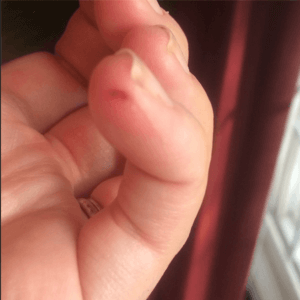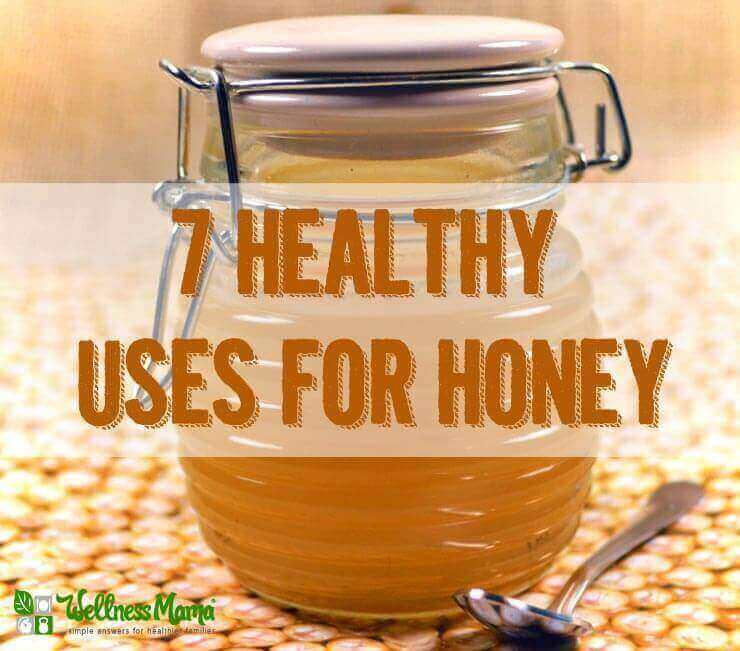Once upon a time, we had a beehive in our backyard. I loved being an amateur beekeeper and we especially loved having a source of (really) local honey. Unfortunately, the kids didn’t love the occasional stings from stepping on a bee, and we had a devastating winter and wax moths took over the hive.
Health Uses for Honey
Our love of raw, local honey stuck around though, and while we don’t use it that often in cooking or eating (since we try to really limit sugar and fructose), I still have many daily uses for honey.
1. As a Natural Face Wash
Sound strange? I thought so too at first, but after trying it, I am a believer.
I usually use the oil cleansing method to cleanse my skin naturally, but if I wear makeup or need to wash my face more than once per day, I use honey.
Honey is naturally antibacterial and is a much gentler way to cleanse skin than harsh soaps and detergents. It doesn’t strip the skin’s natural oils but can hep soften skin and remove blackheads or whiteheads.
Here’s how to wash your face with honey.
2. To Speed Skin Recovery from Cuts and Burns
 The same antibacterial properties that make honey excellent as a natural face wash make it wonderful for speeding recovery from cuts and burns.
The same antibacterial properties that make honey excellent as a natural face wash make it wonderful for speeding recovery from cuts and burns.
Raw manuka honey is now being used in medical settings to help protect wounds (especially with burns) and speed recovery. I’ve seen it work several times in our family- once when my husband had a bad cut on his foot and once when I sliced through most of my finger with a spiral slicer. (The picture on the left is only four days after a really severe cut that bled for almost an hour and that opened back up twice the first night. The combination of topical honey with lavender essential oil and consuming a lot of gelatin helped it heal incredibly fast.)
There are some specific tips for using honey to speed recovery from cuts and burns in this post, but from that article:
“Regular raw/manuka honey can be used and I keep both of those on hand, but I also keep a specific medical-grade honey on hand since it has been verified to have a high concentration of manuka for additional antibacterial properties. I have the following three things at our house for burns and cuts:
- Medihoney Gel for burns and cuts
- Medihoney wound paste
- Medihoney wound dressings for big wounds“
3. Honey as A Cough Remedy
In the rare event that someone in our family comes down with a cold or flu, I use honey to make a natural herbal remedy.
This is one of the most simple natural uses for honey. I combine herbs like Ginger, Cinnamon and Marshmallow Root with raw honey to create a natural cough suppressant that also boosts the immune system to help the body bounce back more quickly.
Here’s the recipe: Natural Herbal Cough Syrup Recipe
4. Herbal Cough Drops
If you’re feeling really ambitious, you can even make herbal cough drops with honey and herbs. I’ll warn you, it can be tricky to get just right and really frustrating if you lose a batch, but if you manage to get them just right, the resulting cough drop is really effective and free of the artificial flavors and dyes that most cough drops have.
Natural homemade cough drop recipe.
5. Honey Shampoo
Honey isn’t just food for the skin- it is good for hair as well. I usually use my homemade mud shampoo or my coconut milk shampoo, but sometimes, when I want my hair to be extra silky, I’ll wash or rinse with raw honey.
The method is simple: just massage a small amount of honey into the scalp and hair and rinse. It is like a shampoo and conditioner in one and it works really well.
I often follow this with my homemade sea spray if I want extra volume or just let my hair air dry for super-silky hair.
6. For DIY Marshmallows
Store bought marshmallows are a disgusting combination of corn syrup, sugar, cornstarch, emulsifiers, and artificial flavors and colors. Traditional marshmallows (while still high in natural sugars) were a much better alternative of real food sweeteners and gelatin (which has many benefits itself).
We don’t make them often, but occasionally we make homemade probiotic marshmallows with real marshmallow root, raw honey, probiotics and gelatin. These are a great treat for the kids without the artificial ingredients.
7. Natural Sleep Aid
I don’t usually have trouble sleeping, but when I do, I have a simple go-to remedy that has never failed me. I simply scoop out a teaspoon or so of raw, organic honey and sprinkle it with about 1/2 tsp of salt. Instant sleep.
From my understanding (thanks to my wonderful doc), in a perfect world, we would have a natural cortisol spike in the morning, which would slowly decline through the day and reach a low at night. This isn’t happening in most cases (a topic for a post of its own) but many people have elevated cortisol at night.
Dr. Christianson talks about the importance of not consuming carbs in the morning and consuming them in the evening (from certain sources) since carbs naturally raise insulin and lower cortisol. You don’t want this in the morning, but when it is hard to fall asleep, this is exactly what you need.
It sounds crazy but it works wonders.
p.s. Honey isn’t the only wonderful thing bees make! Find out more about why I have bee pollen and bee propolis in my kitchen cabinet as well. (Although admittedly they are not as delicious!)
How have you used honey? Any other unusual uses I missed? Share them below in the comments! 🙂




Leave a Reply